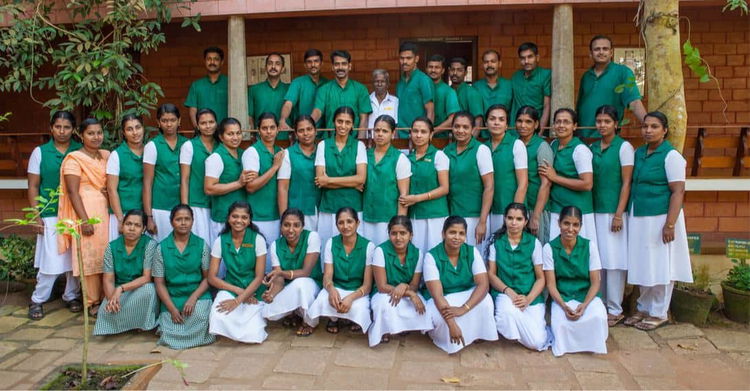The recruitment of nurses to meet shortages in the global north has side-effects—not all good—on their countries of origin.

There’s a line in Mira Nair’s film Monsoon Wedding: ‘Computer engineers are India’s biggest export!’ Maybe it should say nurses instead.
To address the severe shortage of nursing staff in Germany, in December the federal employment agency, die Bundesagentur für Arbeit (BA), signed an agreement with the state of Kerala on their recruitment. The agreement, based on the 2020 Skilled Immigration Act, is the second of its kind Germany has signed with a partner beyond the European Union.
It will be implemented through the Triple Win programme run by the BAand the organisation for development co-operation, die Gesellschaft für Internationale Zusammenarbeit (GIZ). This programme already manages the recruitment of healthcare personnel from Bosnia-Herzegovina, the Philippines and Tunisia, as well as student nurses from Vietnam. It is so-called because it promises German healthcare providers a steady supply of well-trained personnel, the individuals recruited an exciting professional and personal future, and their home-state governments alleviation of some of the pressure on their domestic labour market.
‘Mild demeanour’
The groundwork for this recent BA-Kerala agreement was laid in the 1960s. At the time, German and local clergy partnered to recruit young women from Christian communities in the state to be trained as nurses in Germany. According to the documentary Brown Angels, telling the story of these women, they were thought to be particularly well suited for this role, due to their ‘mild demeanour’ and ‘Christian values’. Such programmes, mostly run by the Catholic Church, continued for two decades.
Whereas scarcity of health personnel was a problem for healthcare providers around the world, Kerala soon began to mass-produce them. So, not before long, the ‘brown angels’ were staffing hospitals in Australia, the United States, the United Kingdom, Austria, Switzerland and the gulf states—and, more recently, Italy, Belgium and Ireland.
Yet India too suffers from a shortage of health personnel. The World Health Organization (WHO) recommends a minimum of four nurses and midwives per 1,000 people but it estimates that in 2019 India had little over half that—3.26 million in a population of 1.38 billion. Worse, a recent study estimates that only 1.4 million are employed in their profession in India and suggests that the country has just 0.6 adequately qualified nurses and midwives per 1,000 people.
The international recruitment of Indian nurses is subject to the WHO Global Code of Practice on the International Recruitment of Health Personnel, adopted in 2010 by its World Health Assembly. This non-binding code provides ‘ethical principles applicable to the international recruitment of health personnel in a manner that strengthens the health systems of developing countries, countries with economies in transition and small island states’. It includes, among other things, the duty to ‘discourage active recruitment of health personnel from developing countries facing critical shortages of health workers’.
Germany has pledged to abide by the code but it claims that the BA-Kerala agreement is not in violation of that pledge. The federal government’s defence is that the agreement is limited to Kerala, which accounts for only 3.1 per cent of the population of India. Yet, according to the WHO, the state also accounts for 38.4 per cent of India’s nurses.
Massive scale
As a result of the 1960s recruitment programmes, Kerala has been training nurses on a massive scale, with the objective for them to emigrate. They have become a significant source of foreign income and eventually part of the state’s development model.
Diaspora nurses reliably send back remittances, which contributed 3.1 per cent to India’s gross domestic product in 2020. This is by far the highest share among the ‘BRICS’ countries (including Brazil, Russia, China and South Africa). And, in proportion to population, the highest share of remittances goes to Kerala.
This foreign cash-flow comes at a cost: it has inflated land prices, while giving rise to some fairly complicated identity politics. But the highest price is paid by those who do not succeed in securing a position abroad.
Rather than taking pressure off the domestic labour market, more than half a century of international recruitment has created a market—for nursing colleges. These graduate tens of thousands of nurses every year who have no professional perspective in their home state.
Predatory practices
In India, nursing is a four-year degree course—and a costly one at that. The total cost averages somewhere between 600,000 and 800,000 rupees (€7,000-9,300). In practice, the cost of this fairly competitive degree cannot be recuperated by exercising one’s profession domestically.
In 2017, the government of Kerala fixed the minimum wage for nurses at 20,000 rupees a month, yet locally employed nurses report monthly salaries as low as 6,000 rupees. They also testify to predatory practices—including terminating the employment of pregnant staff or pressurising them to have an abortion.
The salaries and conditions are such that the vast majority of qualified nurses from Kerala elect not to pursue their profession in their home state, let alone migrate to another in India to do so. They take a different career path or, if their families can afford it, simply stay out of the labour market.
Some end up in Europe, but in precarious 24/7 domestic-care positions or with copious debt owed to a recruitment agency. Some are forced to emigrate to a country, such as one of the gulf states, where nurses might be paid better but whose poor human-rights records look even poorer if one focuses on the rights of migrant workers.
Risky business
Against this backdrop, the BA-Kerala agreement is at one level obviously a good thing. It not only centralises and formalises the recruitment, which has in the past been carried out informally—making it prone to fraud—but implementation will be in partnership with Norka Roots, the government agency in the state capital, Thiruvananthapuram, which liaises specifically with non-resident Keralites. This will hopefully cut out private middlemen and so protect recruited nurses from extortionate brokerage fees.
Yet the agreement revivifies the problematic Kerala development model, based on remittances, providing yet another incentive for young women to bet their fortunes on the risky business of nursing. It’s an investment which, even with this agreement, is bound to fail more often than it will pay off.
Very few Germans today leave school with the intention of becoming a nurse for the rest of their lives. Those who do tend to retire early or withdraw for extended periods, due to the physical and mental toll of the profession.
Given the challenging and, in some instances, hazardous working conditions, the job does not pay well and salaries vary significantly among states and between public and private providers. And, according to the union of healthcare workers, Bochumer Bund—only founded in May 2020—despite being a profession dominated by women the gender pay gap in nursing averages €200-300 a month.
As a result, it is estimated Germany will need an additional 150,000 care workers by 2025. To meet this demand, international recruitment will be an indispensable component. At the same time, labour migration does not fix the profession’s problems. Health workers deserve more respect and validation, which begins with improving their working conditions and addressing ethnic and gender inequalities.
Lys Kulamadayil is an international lawyer and Swiss National Sciences Foundation Ambizione fellow, based at the Geneva Graduate Institute.

